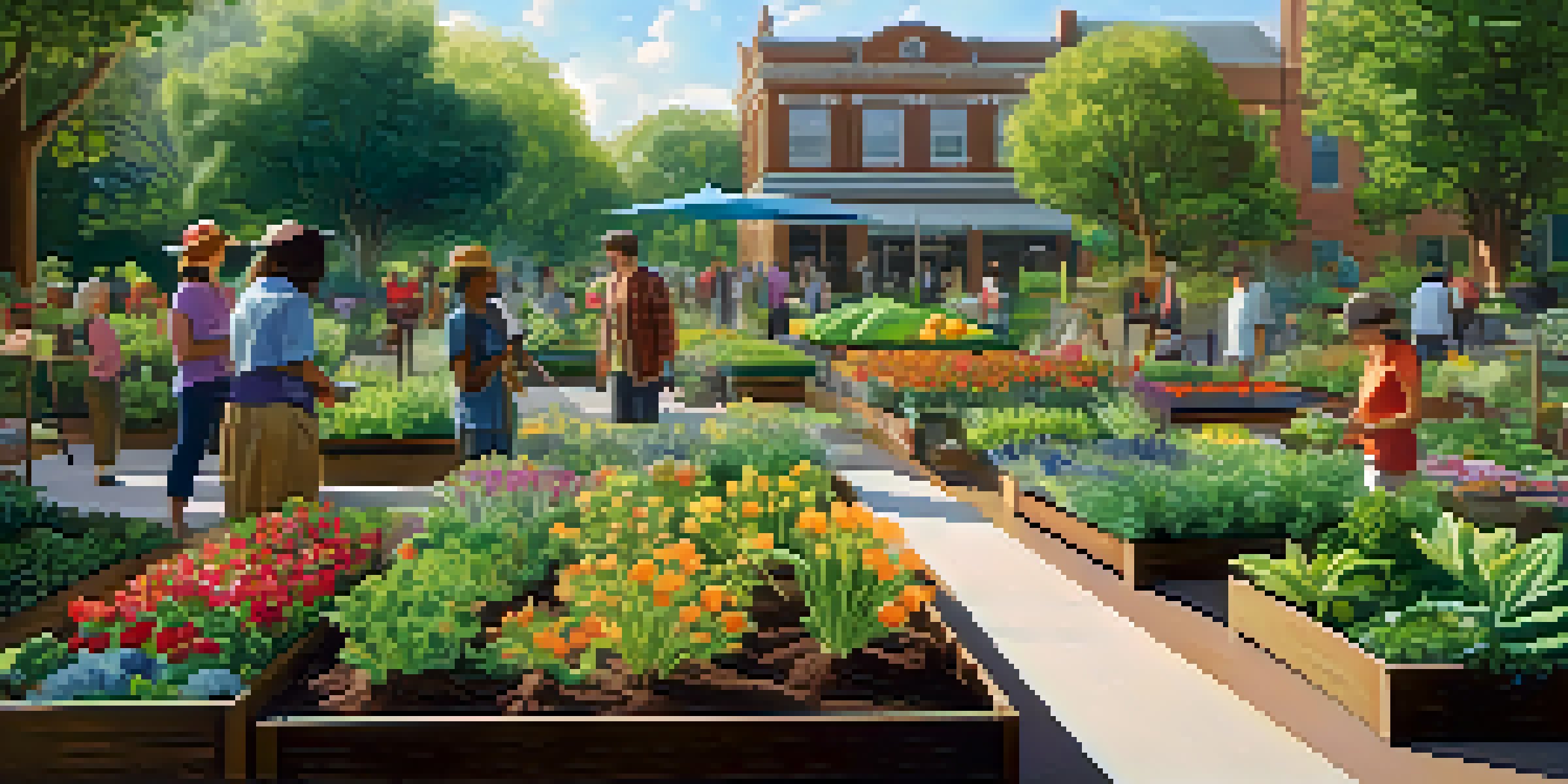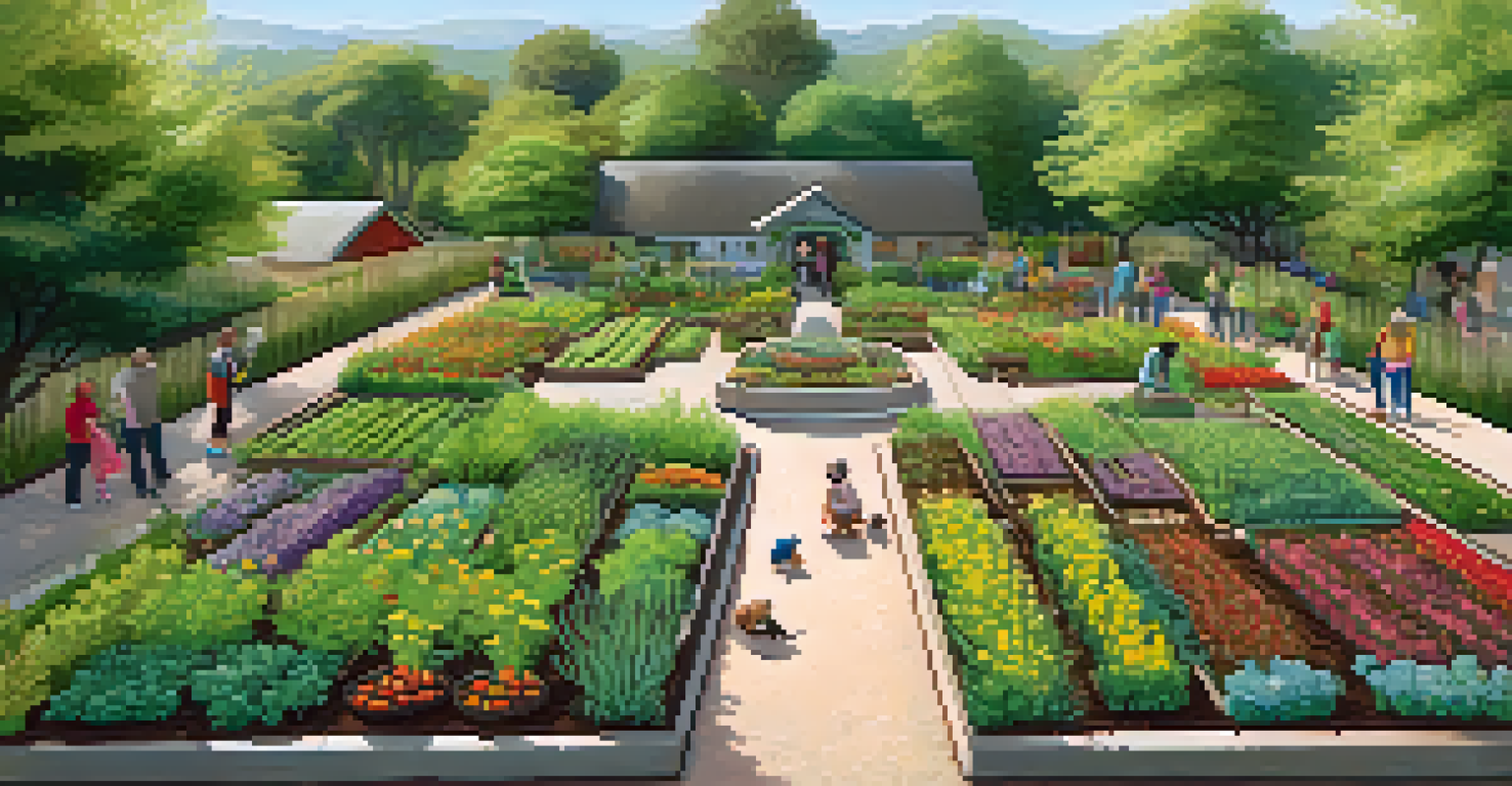The Impact of Botanical Gardens on Local Food Systems

Understanding the Role of Botanical Gardens in Communities
Botanical gardens serve as green sanctuaries in urban areas, providing essential spaces for education, conservation, and community engagement. They often host a variety of plant species, which can include fruits, vegetables, and herbs, showcasing the diversity of local agriculture. These gardens not only beautify neighborhoods but also foster a sense of community by bringing people together around shared interests in nature and gardening.
Botanical gardens are a vital part of our community's ecosystem, providing both education and inspiration for sustainable practices.
Through workshops and events, botanical gardens educate the public about sustainable practices and the importance of biodiversity. This education is vital as it empowers individuals to make informed choices about their food sources and promotes an understanding of where our food comes from. By connecting people with the land, botanical gardens create a bridge between consumers and producers.
Moreover, the presence of a botanical garden can inspire local residents to start their own gardens, further contributing to the local food system. This grassroots movement can lead to the cultivation of fresh produce, which enhances food security and promotes healthier eating habits within the community.
Promoting Sustainable Practices Through Education
One of the key benefits of botanical gardens is their commitment to sustainability. Many gardens offer educational programs focused on organic gardening, permaculture, and sustainable agricultural practices. By teaching these concepts, they encourage individuals to adopt environmentally friendly practices that can be applied at home.

For instance, workshops on composting and water conservation not only help reduce waste but also promote healthier soil and more efficient gardening. Participants learn practical skills that they can implement in their own backyards, leading to a more sustainable local food system. This ripple effect can be significant, as knowledge spreads and more people become involved in sustainable practices.
Community Engagement Through Gardens
Botanical gardens serve as community hubs that foster social connections and promote local food production.
Furthermore, botanical gardens often collaborate with local schools and community organizations to extend their educational reach. These partnerships can help cultivate a culture of sustainability among younger generations, ensuring that the principles of environmental stewardship are passed down.
Enhancing Biodiversity and Local Food Security
Botanical gardens play a crucial role in preserving plant diversity, which is essential for resilient food systems. By cultivating a variety of species, they safeguard against the vulnerabilities of monoculture, where a single crop variety dominates. This diversity ensures that local ecosystems remain balanced and can adapt to changing environmental conditions.
In a world where food security is increasingly threatened, botanical gardens stand as beacons of hope, cultivating both plants and community resilience.
In addition to conservation, botanical gardens often serve as seed banks, collecting and preserving heirloom and native plant varieties. These seeds can then be distributed to local farmers and gardeners, promoting the growth of diverse crops within the community. This access to varied plant species enhances local food security by reducing reliance on commercially produced goods.
Moreover, when local food systems thrive on diversity, communities are better equipped to withstand economic fluctuations and climate challenges. A robust local food system contributes to a healthier population and a more sustainable environment, making botanical gardens key players in this dynamic.
Community Engagement and Social Cohesion
Botanical gardens are often more than just places to learn about plants; they serve as community hubs where people come together. Events such as farmer's markets, plant swaps, and community gardening days foster connections among residents, creating a sense of belonging. These gatherings not only promote local food production but also strengthen social ties within the community.
Engagement in community gardening can also lead to increased access to fresh produce, particularly in areas classified as food deserts—regions with limited access to affordable and nutritious food. By growing food together, community members not only improve their diets but also build relationships that enhance local resilience.
Promoting Sustainable Practices
Botanical gardens educate the public on sustainable agricultural practices, encouraging environmentally friendly habits.
Additionally, these social interactions can inspire collaborations between various community groups, such as schools, local businesses, and non-profits. Such partnerships can amplify the impact of botanical gardens, creating a multifaceted approach to improving the local food system and overall community well-being.
Encouraging Local Economies Through Agriculture
Botanical gardens can significantly contribute to local economies by supporting small-scale farmers and agricultural businesses. By providing platforms for local vendors to sell their products, such as farmers' markets or pop-up events, gardens create opportunities for economic growth. This not only benefits the farmers but also enriches the community's access to fresh and local produce.
Moreover, educational workshops and events hosted by botanical gardens often attract visitors, boosting local tourism. People travel to experience the beauty and diversity of these gardens, which can lead to increased spending in nearby shops, restaurants, and accommodations. This economic stimulation can have a lasting impact on local businesses.
As communities embrace the concept of supporting local agriculture, the economic benefits can extend to other sectors, such as restaurants that prioritize farm-to-table practices. This interconnectedness reinforces the importance of a thriving local food system and highlights the role botanical gardens play in sustaining it.
Challenges Facing Botanical Gardens in Supporting Food Systems
Despite their many benefits, botanical gardens face challenges in their mission to support local food systems. Funding can be a significant hurdle, as many gardens rely on grants and donations to operate their programs. Without sufficient financial support, their ability to offer educational initiatives and community engagement activities may be compromised.
Additionally, there can be a disconnect between botanical gardens and the communities they serve. If gardens do not actively engage with local residents to understand their needs and interests, they risk becoming underutilized resources. It's essential for gardens to foster relationships and adapt their offerings to better align with community priorities.
Enhancing Local Food Security
By preserving plant diversity and acting as seed banks, botanical gardens strengthen local food systems and resilience.
Lastly, the impact of climate change poses a threat to botanical gardens and their ability to maintain diverse plant collections. As weather patterns become more unpredictable, gardens may struggle with plant survival and require innovative strategies to adapt. Addressing these challenges is crucial for ensuring that botanical gardens continue to play a vital role in local food systems.
The Future of Botanical Gardens in Local Food Systems
As we look to the future, botanical gardens are poised to become even more integral to local food systems. With growing interest in sustainability and local food production, these gardens have the opportunity to expand their educational programs and outreach efforts. By harnessing the power of technology, they can reach wider audiences through online workshops and resources.
Moreover, partnerships with local governments and organizations can help secure funding and resources needed to enhance their impact. Collaborative initiatives, such as community-supported agriculture (CSA) programs, can further connect residents with local growers, strengthening the food system as a whole.

Ultimately, the future of botanical gardens lies in their ability to adapt and innovate. By staying attuned to community needs and environmental changes, these gardens can continue to thrive as vital components of local food systems, promoting health, sustainability, and community cohesion.